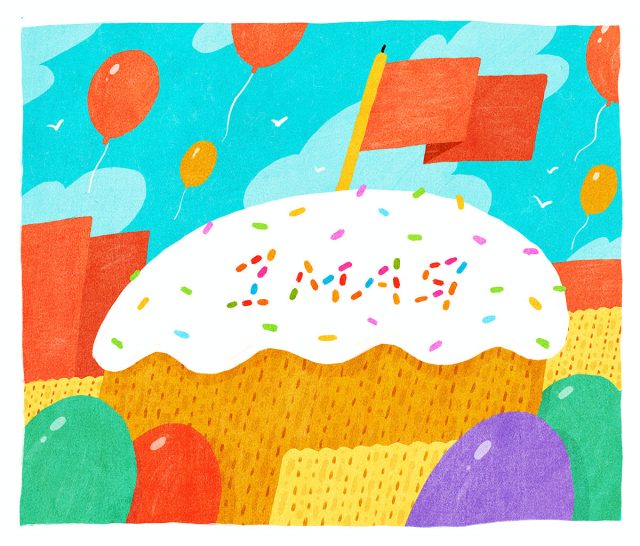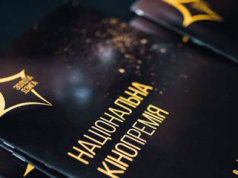The writer Yulia Verba has recentlly published a very funny book of short stories “Spawn of the Moldavanka” which is set in the dilapidated communal courtyards of the working class Odessa neighborhood of Moldavanka. Historically, the Moldavanka (named for migrants from Moldova) has always been a melting pot, a cramped living space through which generations of immigrants passed on their way to assimilating into the society, a place where new slang was cobbled together out of the spare parts of the many languages that were spoken by the people who lived there. The unique language of the Moldavanka is based on jazzy improvisational colloquialisms fashioned into a panoply of multilingual slang
“Religion For The People” A special story from Moldovanka, written especially in time for the passover holidays. Verba has previously been featured in the My Odessa Column.
Her previous Moldavanka stories can be read here.
In Moldavanka, we adored all the holidays – both civil and religious. The spirit of love, joy, and even the occasional absolution would float over freshly washed sheets from Christmas to Purim, including the 7th of November (the anniversary of the Great October Revolution). Because the highlight of all these holidays was feasting. We compensated for theological gaps with sincerity and rituals. Grandmothers sustained the bridges between generations, regardless of the party and religious affiliation of the rest of the family.
These were fragments from different puzzles which unexpectedly fit together. It became fabulous surrealism with an emphasis on gastronomy.
Our home hosted Passover, Easter and May Day. It always began with conspiratorial preparations for… May Day, which, for some reason, started in March. Great-grandma would define in some way, comprehensible by her only, when International Workers’ Day was so close that a full-scale cleaning — with couches moved and carpets flipped — was urgent. ‘Not a crumb in the house!’, our Zhenya Ivanovna commanded. Labour and filth are incompatible! And grandma would bring from work, instead of “Bomboane” sweets purchased from profiteers, a box of matzo, saying that she had been treated with something exotic. Matzo bewitched us, especially after Mom told us that it’s machine-stitched. Mom often sewed clothes for us, so we suggested that she could stitch some of those tasty biscuits herself, instead of year-long waiting for profiteers and donors. She refused, for some reason. As a matter of fact, there was much inexplicable in those sacred spring days. For instance, great-grandma’s sudden (yet also synchronized with the emergence of matzo) care in the form of grated apples, more appropriate for toddlers. Who would say no? But then she would just as suddenly and illogically stop grating them and say: “Eat like this – you’re not royalty”.
Grandma would accompany matzo with “Rumyaniye Schyochki” (“Rosy Cheeks”) grape juice sold in glass jars and make two holes in the caps. Drinking “straight from the bottle” was the highest privilege.
Once Lesya discovered an inscription on her jar, right under the drawing of a kid. It read “Aligote”. Mine said “Riesling”. «Aligote» was occasionally consumed by grandpa Pava, when the grocery store suffered outages of port wine. Riesling was also present in the wine section. Our parents kept trying to convince us that those were only grapes grades, but we decided that from that time on we needed to clink our jars.
All the neighbours were compulsorily treated to festive food. Aunt Ida and Aunt Lyusya would bring matzo — we never shared ours. But later we would feed them Easter cakes. Testing whether a cake was not “glistening” wet and undercooked and whether the “doklad” (the amount of butter, eggs and sugar in it) was rich was lovingly practiced even by atheists and communists.
Yet all the matzo tasted the same, unlike Easter cakes. From children’s point of view, such an exchange was unequal.
Mom baked Easter cakes in archaic, crude iron molds according to a family recipe from “Of Good and Healthy Food” (a Soviet cookbook). In front of the dough, you weren’t allowed to argue, make noise, blow your nose or open the window. The dough was hand-kneaded in a bucket. Everything kneaded for less than an hour was considered to be good-for-nothing even before it was baked. And then there were three days of torture – the cakes smelled like danish, lemon peel and a holiday, but eating them before Sunday was was strictly prohibited. Special dye for eggs would be purchased like drugs from Gypsies at the Privoz market. It was wrapped in small envelopes made from copybook pages. And every time it was Russian roulette — predicting the dye quality and result was almost impossible.
At the breakfast table, there were triple kisses, “battles” with dyed eggs, and a “Master Chef” super final with mother-in-law: whose cake is better? Following the Christian doctrine of love and our self-preservation instinct, we pretended we couldn’t taste any difference.
Grandma Klava, a marginal Catholic, used to bake a pastry lamb in some special mold. It was so beautiful that eating it would be blasphemous. People would come just to take a look at it.
And dad, who grew up in the post-war years, told us that the time between Easter and the Slavic memorial holiday of Radonitsa was the best. All the kids in the yard would run to the cemetery and stuff themselves for a month ahead.
Meanwhile, Yosya Goldman didn’t go to the cemetery. Instead, during puberty, he would enthusiastically greet all the girls, holding a bunch of willow canes, and flog their legs shouting: “Не я б’ю – верба б’є – за тиждень Великдень.”(“ I don’t hit – the willow hits. For the Easter week”).
And only then, later, having crossed crumbs, chicken legs, and eggs broken in family competitions out from the must-do list, Great-grandma would serve a tray full of hot pie to finish off this spring marathon. In order for the desert to fit the occasion, she would form “May 1st” from quince jam on the surface. She would finally relax. With a glass of cognac in her hand, she would utter the words “we worked so hard that now it’s a two-day rest”, and sit down to watch TV. Tipsy run-aways from factory demonstrations would come back to our yard with red bows on their chests and trophies of visual propaganda. While George Lucas was directing the first “Star Wars” on the other side of the globe, we had no less stunning Jedi lightsabers made of carnations on mop poles — after the official part of the celebration, they were perfect for fighting.
I strongly believed I knew all about holidays after growing up in the international Moldavanka. I was wrong. I experienced an ethnographic embarrassment in Western Ukraine. After traditional Sunday celebrations came “Wet Monday” — the very day after Orthodox Easter. I thought that, on that day, according to the ancient local custom, young men would wait for unmarried girls next to the well and splash water at them “for luck”. In any weather, the girls were supposed to pay for such luck with a decorated egg. It turned out that the tradition is not simply still alive. The modern interpretation is practiced by all the men, regardless of of their age, and they use not only water but also cheap cologne from a village store. Suffering from yesterday’s indigestion, I crawled out into the kitchen. And here the master of the house, an elderly, plump vuyko (Western-Ukrainian for “uncle”), jumped out from his ambush and poured half a bottle of “Shahrazad” cologne on my head while whooping like a teenager. From the suddenness and the stink, my thin shell of intelligentsia immediately cracked and the collective unconscious of the streets spread its wings like a pterodactyl. Squinting my burnt eye and forgetting my bride-show status, I told him everything about Soviet perfumes, pagan anachronisms, and dementia in the Odessan patois. The most impressive thing for my potential relatives was the unfamiliar, yet definitely offensive word “meshuggener”.




































